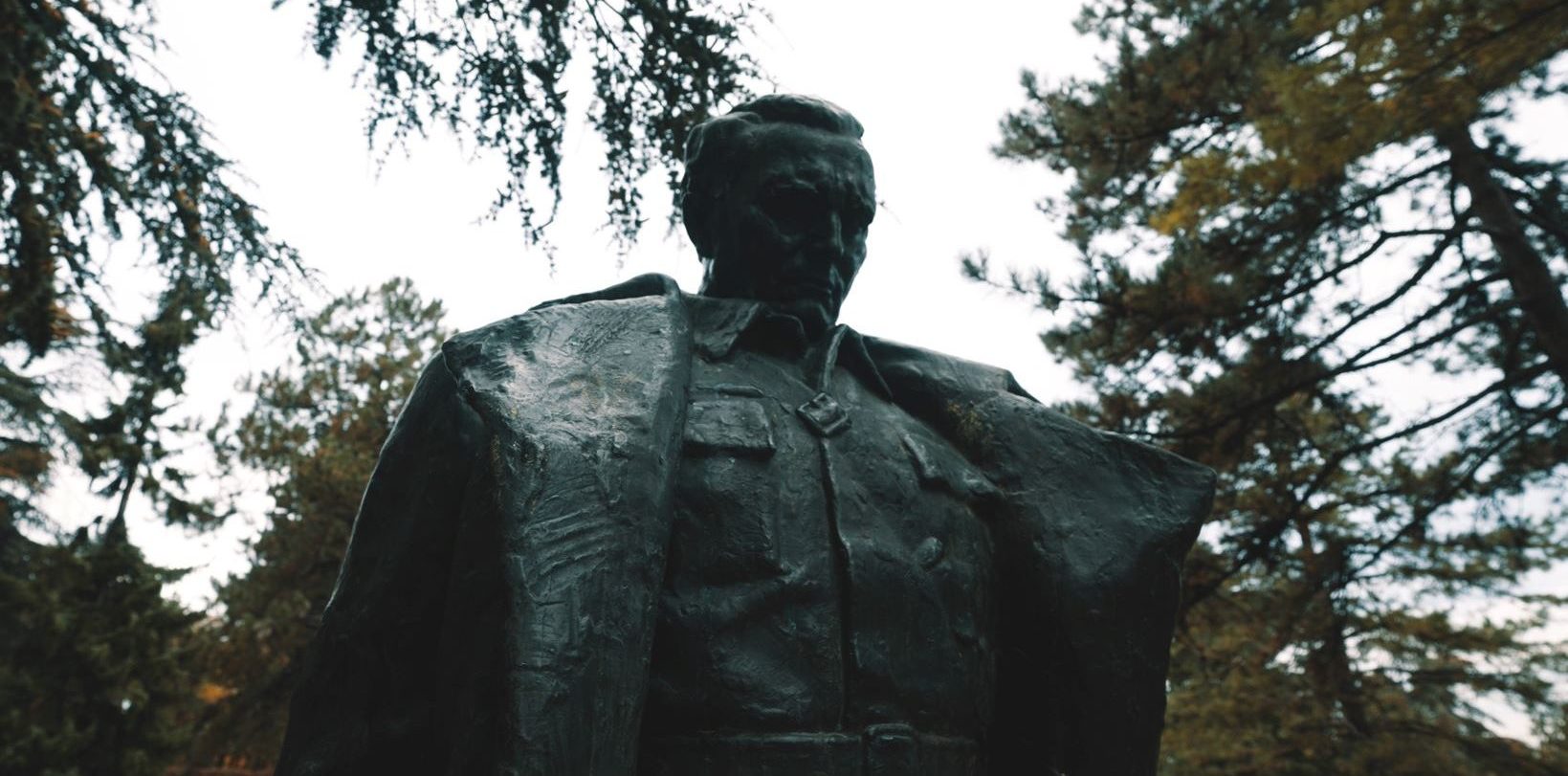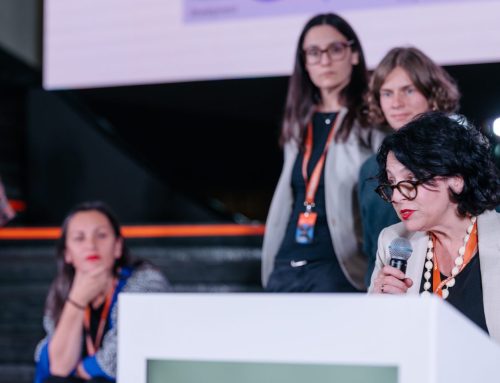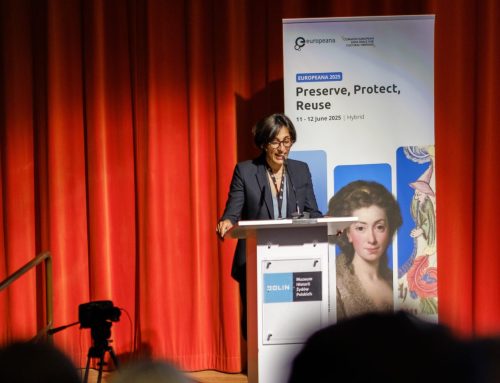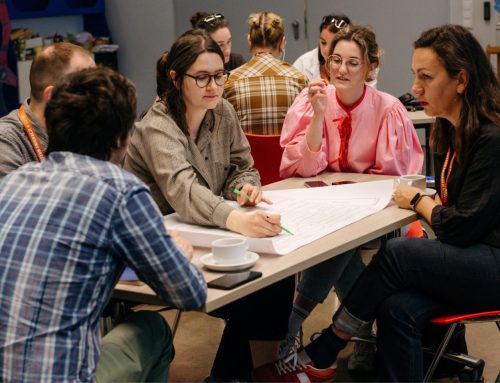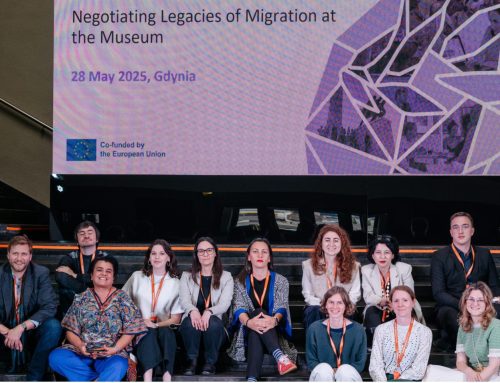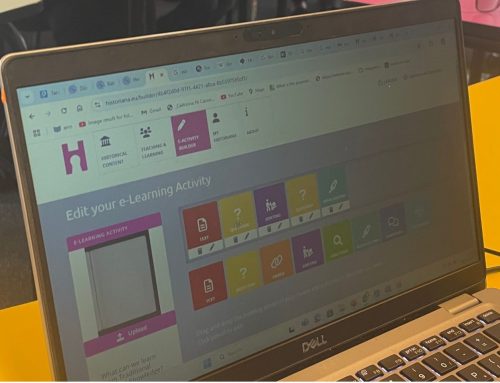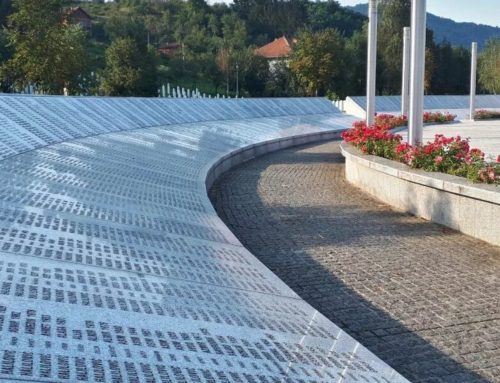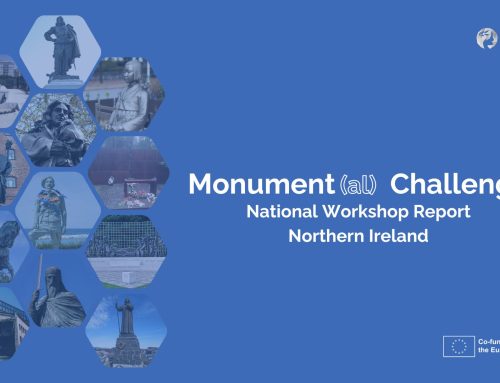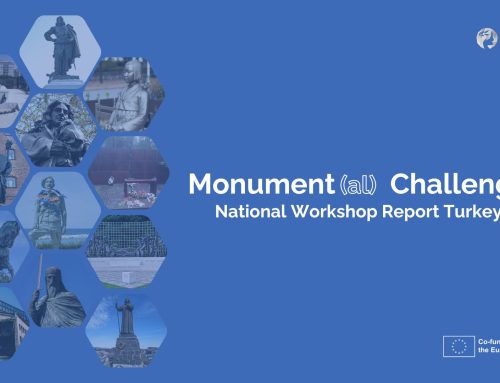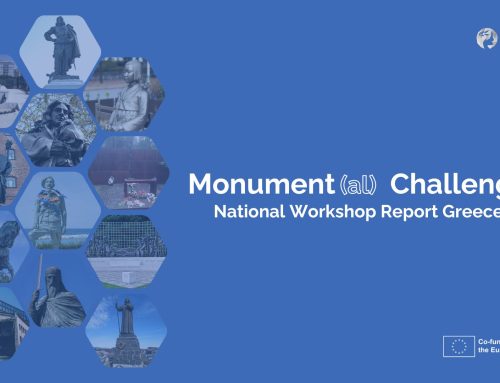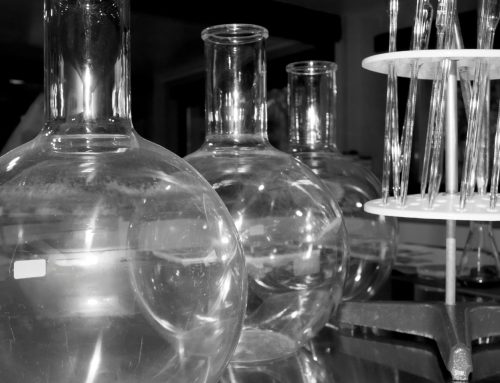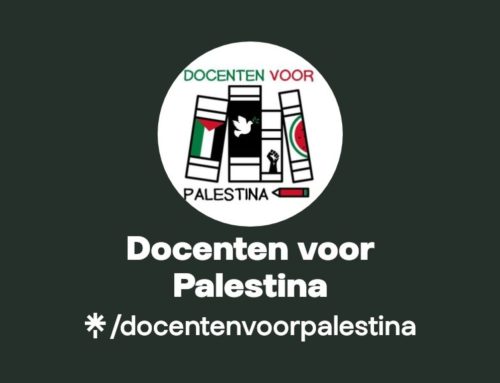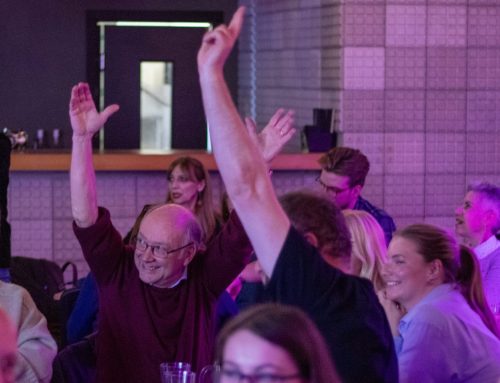[This article is also available in Serbian further down on this page]
In the last few years, people in Serbia have been constantly exposed to sensationalistic discoveries of how endangered the Serbian state is; especially its “vital organs”, such as education. Hysteric voices are often heard in the public space that “Serbian national identity” is threatened by both – internal enemies and external factors. It is claimed, mostly via tabloids and similar media, that “foreigners” influence writing textbooks and teaching programs in Serbia. According to these claims, their goal is to form a “new mental code of the nation” (whatever that means). For several years we have been witnessing “janissary scandal”, “expelling poet Desanka Maksimović from high school syllabi”, “spelling books that are written in Germany”, “Croatians who are paying Serbian historians to diminish the numbers of Jasenovac victims”, “The International Court of Justice in the Hague which is teaching children the only perpetrators are the Serbs” etc. History and history teaching have come to the spotlight of a tabloid audience. Therefore, it has provided fertile soil for manipulation and forged truth. Numerous notable historians consider the recent past, more precisely the wars of the 1990s, should not be taught in schools because “it has not been scientifically and critically analyzed in historiography” or it was done by certain NGOs whose idea is solely propaganda. However, we are still missing the answer to why the academic community has not been dealing with the wars of the 1990s in the past 25 years. What is preventing from doing it, except maybe fear – fear of those who are writing about the recent past, or those who are teaching it? Or is it a fear of the past itself?
Recently, the reformed teaching and learning programs for high schools and secondary vocational schools have been particularly targeted. Caretakers for the welfare of Serbian education are afraid that reformed history teaching would only lead to the creation of historical consciousness among the youngsters shaped by the street, newspapers, politics, interest groups and international influence”. Even though similar opinions can be found among some teachers, they lack argumentative criticism. The newly reformed syllabi showed, on one hand, a certain dose of misunderstanding of the new ideas of outcome-oriented teaching, and, on the other, incompetence to apply these ideas in the classroom. Teachers of grammar schools and secondary vocational schools might not have undergone a sufficient number of qualitative trainings in order to better prepare for the implementation of reform programs that have been put in use in schools for the fourth year, but the question arises whether this type of omission can be used as an argument in the demolition of one of the most important reforms implemented in our education system. The thesis about the foreign authors writing history textbooks in Serbia has been refuted several times. It is enough to look at the catalogs of approved textbooks for primary and secondary schools and see that among the names of the authors are exclusively domestic authors, among whom the local ones stand out: academics, university professors, researchers from the institute, and teachers. An insight into the Law on Textbooks clearly shows the process of approving and accrediting textbooks in which the state has the main say and controls the entire process through the bodies of the Ministry of Education. Claims about the foreign textbook authors is related to the attacks on certain teacher’s associations that work on programs for the professional development of history teachers (in-service training and seminars).
Dealing with sensitive topics of the recent past is a great challenge for teachers.
The Association for Social History – Euroclio was exposed to a media lynching. This association of teachers, which implements regional and international projects, has been marked as a subversive element that acts as an exponent of foreign factors in the field of education. In any society that approaches the study of the past responsibly, efforts leading to regional and international networking of teachers are likely to meet with praise and public support. The lack of pluralism in public space has left many with the opportunity to use the wave of nationalism, chauvinism, and populism to attack those of the opposite viewpoint.
Moreover, there are frequent accusations in which it is suggested that national history is suppressed in comparison to the general one, with the aim of “erasing Serbian historical consciousness” and forming a new one. Although the new reform of the curriculum does not prescribe the exact relationship between the representation of national history and the general one, it is not clear why critics of the reform insist on endangering “ours”. An insight into the programs and textbooks shows that in terms of content, more or less everything has remained the same as in the period before the reform. As one of the main pillars of the reform, the teacher is, according to the new curriculum, enabled to set and implement dynamics that he/she finds necessary to meet the needs of the system itself, as well as of each class particularly.
The biggest problem occurs when it comes to the neuralgic points of history such as World War II, attitudes towards communism, crimes, genocide, Jasenovac, wars of the 1990s, etc. Topics that are often the subject of heated debates and manipulation in public history easily find their reflection in controversies about history teaching. When the debate shifts to the “track” of each of the former Yugoslav republics, the situation becomes even more complicated. Formal narratives, which are often opposed to narratives created within the academic community, are constructed by the dominant political elites. Official narratives imposed through the media provide a false image of the past.
Dealing with sensitive topics of the recent past is a great challenge for teachers. Unfortunately, students gain knowledge about the recent past through the media, social networks, “family narratives” and other informal sources of knowledge. School as the weakest element in the system rests on the teacher and his/her competencies to deal with sensitive topics. Announcements of the state authorities on the preparation of unique textbooks for the so-called “Identity subjects” (history, Serbian language, and geography), which should be compulsory for students from Serbia and Republika Srpska, will abolish pluralism in the textbook market. It has already been said that the state controls and approves the process of publishing textbooks, but the idea of a unique history textbook is supposed to solve all problems that have troubled the public in recent years regarding alleged “foreign interventions” in the field of textbooks in Serbia. Is this a solution to all the problems we encounter in history teaching? I am sure that it is not, just as I am sure that the “fear of history” will not disappear.
This article was written by Aleksandar Todosijević.
He is a history teacher in Serbia and and member of EuroClio, working on the project “Learning History that is not yet History II” as author and country coordinator.
___________________________________
KO SE PLAŠI ISTORIJE?
Poslednjih nekoliko godina javnost u Srbiji je neprestano izložena senzacionalističkim otkrićima koja uglavnom služe tome da se potkrepe teze o ugroženosti srpske države pa samim tim i njenih “vitalnih” sistema kao što je obrazovanje. Histerični glasovi u javnosti često nas podsećaju da je „srpski nacionalni identitet“ ugrožen od strane “unutrašnjeg neprijatelja” i međunarodnog faktora. Oni tvrde, uglavnom putem tabloidnih medija, da stranci imaju veliki uticaj na srpske udžbenike, programe nastave i učenja, i druge aspekte obrazovanja sa ciljem da formiraju „novi mentalni kod nacije“ (šta god to značilo). Unazad nekoliko godina bili smo svedoci isfabrikovanih afera o „janičarima“, „izbacivanju Desanke Maksimović iz gimanzijskih programa“, „pisanju bukvara u Nemačkoj“, „strancima koji pišu ovdašnje udžbenike“, „Hrvatima koji plaćaju srpske istoričare da umanjuju broj žrtava Jasenovca“, „Haškom tribunalu koji uči decu da su Srbi zločinci“ i dr. Istorija i nastava istorije našle su se pod lupom “tabloidne” javnosti. Kao takve pogodne su za razne vrste manipulacija i iskrivljivanja istine. Mnogi ugledni istoričari smatraju da period najnovije prošlosti tj. ratova devedesetih ne bi trebalo izučavati jer “nisu naučno i kritički obrađeni u istoriografiji” i da ih pojedine nevladine organizacije obrađuju na “propagandni” način. Međutim, izostaje odgovor na pitanje zašto se naučna zajednica ne bavi ratovima devedesetih poslednjih 25 godina? Šta ih sputava u tome osim sopstvenog straha – straha od onih koji pišu o njoj ili od onih koji podučavaju? Ili se plaše same istorije?
Suočavanje sa senzitivnim temama bliske prošlosti predstavlja veliki izazov za nastavnike.
U poslednje vreme naročito su bili na udaru reformisani programi nastave i učenja za gimnazije i srednje stručne škole. Dušebrižnici za dobrobit srpskog obrazovanja strahuju da će nastava istorije sprovedena na reformisani način dovesti do toga da će “istorijsku svest mladih generacija formirati ulica, štampa, politika, interesne grupe i međunarodni faktori”. Iako takva mišljenja imaju jako uporište u javnosti i među pojedinim nastavnicima, jedino što nedostaje jeste argumentovana kritika. U osnovi implementacije novih reformisanih programa nastave i učenja stoji veliko nerazumevanje i nedostatak kompetencija pojedinaca za njenu primenu u učionici. Iako je činjenica da nastavnici gimnazija i srednjih stručnih škola nisu prošli kroz dovoljan broj kvalitativnih obuka kako bi se što bolje pripremili za primenu reformisanih programa koji se već četvrtu godinu sprovode u školama, postavlja se pitanje da li se ova vrsta propusta može koristiti kao argument u rušenju jedne od najvažnijih reformi koja se sprovodi u našem obrazovnom sistemu. Teza o tome kako nam stranci pišu udžbenike istorije opovrgnuta je više puta. Dovoljno je pogledati kataloge odobrenih udžbenika za osnovne i srednje škole i videti da su među imenima autora udžbenika istorije isključivo domaći autori među kojima se posebno ističu ovdašnji: akademici, univerzitetski profesori, istraživači sa instituta i nastavnici. Uvidom u Zakon o udžbenicima jasno se vidi proces odobrenja i akreditacije udžbenika u kojem država ima glavnu reč i kontroliše ceo proces preko organa Ministarstva prosvete. Teza o strancima koji pišu udžbenike je u vezi i sa napadima na pojedina udruženja nastavnika koja sprovode određene programe za stručno usavršavanje nastavnika istorije. Udruženje za društvenu istoriju – Euroclio je bilo izloženo medijskom linču putem tabloida. Udruženje nastavnika koje sprovodi regionalne i međunarodne projekte označeno je kao subverzivni element koji na polju obrazovanja deluje kao eksponent stranih faktora. U svakom društvu koje odgovorno pristupa proučavanju prošlosti napori koji vode regionalnom i međunarodnom povezivanju nastavnika naišli bi verovatno na pohvale i podršku javnosti. Nedostatak pluralizma u javnom prostoru ostavio je mogućnost mnogima da iskoriste talas nacionalizma, šovinizma i populizma kako bi napadali neistomišljenike. S tim u vezi su i česte optužbe u kojima se sugeriše da se nacionalna istorija potiskuje u odnosu na opštu, s ciljem da se učenicima „izbriše srpska istorijska svest“ i formira neka nova. Iako nova reforma programa nastave i učenja ne propisuje tačan odnos zastupljenosti nacionalne istorije u odnosu na opštu, nije jasno zašto kritičari reforme uporno insistiraju na ugroženosti “naše”. Uvidom u programe i udžbenike može se videti da je što se tiče sadržaja, manje-više sve ostalo isto kao i u periodu pre refome. Kao jednom od glavnih oslonaca reforme, nastavniku je omogućeno da zadati i od države odobreni program nastave i učenja sprovodi dinamikom koja sa jedne treba da odgovori na potrebe sistema, ali i na specifičnosti svakog odeljenja.
Najveći problem nastupa kada dođemo do neuralgičnih tačaka istorije kao što su: Drugi svetski rat, odnos prema komunizmu, zočini, genocid, Jasenovac, ratovi devedesetih, … Teme koje su često predmet oštrih debata i manipulacija u javnosti našle su svoj odraz i u polemikama oko nastave istorije. Kada se debata prebaci na “kolosek” svake od bivših jugoslovenskih republika, situacija se dodatno komplikuje. Zvanične narative koji su često suprotstavljeni narativima koji se kreiraju u okviru akademske zajednice, kreiraju dominantne političke elite. Zvanični narativi koji su nametnuti putem medijskog prostora, stvaraju lažnu sliku o prošlosti. Suočavanje sa senzitivnim temama bliske prošlosti predstavlja veliki izazov za nastavnike. Učenici, na žalost, znanja o bliskoj prošlosti crpe putem medija, društvenih mreža, „porodičnih narativa“ i drugih neformalnih izvora znanja. Škola kao najslabija karika sistema počiva na nastavniku, tj. njegovim kompetencijama da se suoči sa osetljiim temama bliske prošlosti. Najava državnih zvaničnika o pripremi jedinstvenih udžbenika iz tzv. „identitetskih predmeta“ (istorija, srpski jezik i geografija), koji bi trebalo da budu obavezni za učenike iz Srbije i Republike Srpske, ukinuće pluralizam na tržištu udžbenika. Iako je već rečeno da država kontroliše i odobrava proces izdavanja udžbenika, ideja o jedinstvenom udžbeniku iz istorije trebalo bi prema ocenama državnih organa da reši sve probleme koje uznemiruju javnost poslednjih godina u vezi navodnih „stranih intervencija“ na polju udžbenika u Srbiji. Da li će time biti rešeni svi naši problemi sa kojima se susrećemo u nastavi istorije? Siguran sam da neće, kao što sam siguran i da “strah od istorije” neće nestati.
– Aleksandar Todosijević

